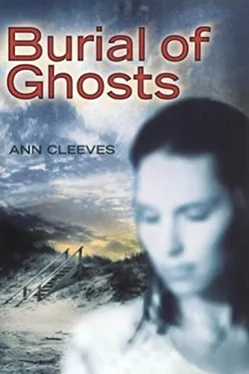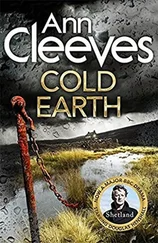‘I’ll come in over the weekend to clear up,’ she said. ‘I don’t think I can face it today.’ Usually, I could tell, she wouldn’t have dreamt of leaving it in a mess.
‘I was so sorry,’ I said. ‘About Thomas.’
‘You found him, the police said.’
I nodded, waited for her to lead the conversation. I was feeling my way here. Everything had to be at her pace.
‘Was it the first time you’d visited? Or had you managed to see him before?’
‘It was my first visit. I never met him.’ I was going to add ‘alive’, but that would have been crass.
‘Ah.’ She tried to control her disappointment. What had she hoped to get from me? Absolution? Don’t worry. Thomas forgave you for pushing him out of the house. He told me he loved you. He understood. Would that have helped? Anyway, it wasn’t something I was prepared to lie about.
‘I wish I’d done things differently,’ she said simply.
‘You’re not guilty. You didn’t kill him.’
‘But I feel as if I did.’ She paused. ‘It was my decision to ask him to leave, you know, not Ronnie’s.’ She seemed to be expecting me to speak. Would it have made her feel better if I’d had a go at her? Is that why she’d asked me there? ‘Ronnie doesn’t mean to put me under pressure,’ she went on. ‘But he needs me. More perhaps than Thomas ever did. Thomas never understood that.’
I didn’t answer. Of course Thomas wouldn’t understand. I couldn’t understand. She was his mother. At last she continued. ‘It wasn’t Ronnie’s fault. Honestly.’
‘Why does he need you so much?’ I’d lost patience. I mean, he was a grown man, wasn’t he? Capable of looking after himself.
She took a long time to reply. In the distance there was the hum of a floor polisher. The tap at the sink in the corner was dripping.
‘When he was young he saw action overseas. Some of the things he witnessed still give him nightmares.’
Suddenly the stuff Dickon had told me made sense. That was why Philip had been sympathetic to Ronnie. It explained the dens in the woods and the campfires. Boys’ games. Even if Ronnie had had a difficult time as a soldier, he’d need to feel proud of some of it. The friendships, perhaps, the skills he’d learned. There’d have to be some good memories or he’d go under altogether. It was something I was starting to realize for myself.
I was about to rattle on about post-traumatic stress. Ask if Ronnie had arranged counselling, tell her that even the army recognizes it as an illness now. I did a special study at college, so I’m pretty clued up. And of course since then I’ve had personal experience. I knew about flashbacks and panic attacks. I knew exactly what he was going through. I’d always thought we had something in common. Was it the Falklands? I was going to say. The Gulf? I’d read up on the conflicts, knew more about them than other people my age. I saw Ronnie in a different light. Not just as someone screwed up and desperately shy, but as a bit of a hero.
But before I had a chance to show off she started to speak again. ‘It wasn’t the British army. That would have been easier. He could have asked for help. He did start the training, but he couldn’t finish. Not his fault.’
Was anything his fault? I wanted to ask. But I had the sense not to interrupt.
‘So he worked abroad,’ she said. ‘There’s an agency…’
Still I didn’t get it.
‘… run by former British officers. They provide assistance in conflicts when the government can’t be seen to be involved.’
‘He was a mercenary!’ That time I couldn’t help it. I was shocked. He’d always seemed too gentle for his own good. I’d imagined him bullied by an overcontrolling wife. And I thought I was a good judge of character. I couldn’t imagine him peddling violence.
‘No.’ She sounded shocked too. ‘He was an idealist. He thought he was helping. Anyway, he didn’t work for them for too long. It affected him too deeply.’
Just long enough to get the cash for the garage, I thought, and wondered what the Methodist Wives would have made of his past.
‘It took some time before he could trust me to talk about it,’ Kay said. ‘He’s a private man, very reserved. Perhaps he comes across as unfriendly. I know my mother and father couldn’t warm to him, but their judgement is suspect at times.’
‘Has he ever tried to get professional help?’
She shook her head. ‘He’s too proud. He says it wouldn’t help anyway, to relive those experiences. He needs to believe he’s in control.’
‘And is he?’ I asked.
‘What do you mean?’
‘Does he still have nightmares?’
‘Not so often. Not nearly so often.’
‘What about the other symptoms? The fits of anger, the depression, the sleeplessness.’
‘Things improved when Thomas left home.’ It was a terrible admission for her to make. ‘He provoked Ronnie. He didn’t understand. Ronnie wouldn’t let me explain. As I’ve told you, he saw the illness as something he had to deal with alone.’
Not really alone, I thought. He drew you into it. You and Thomas and the kids.
‘Getting involved in the campaign with the Countryside Consortium helped. It was something he could get passionate about. It stopped him thinking quite so much about himself. He was good at the outdoor work. People recognized that and it gave him confidence.’
‘Wasn’t it awkward for you to think about him and Philip Samson becoming friends?’
‘What do you mean? Philip was a lovely man. He was so busy before he was ill, rushing round the globe for the television programmes and new commissions, but he still found time for Ronnie. It was a tragedy when he died. It shook us all.’
She was convincing all right. I thought she’d spent so long blocking out the knowledge that Philip was Thomas’s father that she’d almost conned herself. I stared at her. She was still sitting on the little table, but she had her head bowed and her hands clasped like someone praying. Perhaps she was. She didn’t look up.
‘I know,’ I said.
She raised her head. For a moment it seemed she’d forgotten where she was. I wondered if she was remembering Philip as a student, the irresponsible passion of that spring twenty years before. ‘I’m sorry?’
‘I know that Philip Samson was Thomas’s father.’
‘Where on earth did you get that idea from?’ She looked at me as if I’d made a joke in poor taste. Some instinct of self-preservation stopped me telling her. From Philip. That’s why I came to your house before Thomas’s death. Philip wanted to trace him. Instead I said, ‘Isn’t it true, then?’
‘Of course it’s not true. I’d never met Philip before Ronnie started going to the Countryside Consortium meetings, and I never knew him well. Ronnie met him at one of Joanna’s social evenings and they seemed to get on. The closest I’d got to him before then was through seeing him on the television.’
I believed her. If it wasn’t true, she was way ahead in the Dan Meech school of acting. I was still trying to get my head round the implications of it when she started talking, pouring out a story which had been bottled up all that time, which she’d never told anyone, not Ronnie or her mother or her son.
‘I was young,’ she said. ‘Naïve. I wasn’t like the young girls today, who are brought up to see sex wherever they look. If I led him on, I didn’t know what I was doing. I’ve gone over and over it in my head. I feel it was my fault but I don’t see how it could have been. I was still a child. Not legally perhaps, but in every way it matters. He was old enough to be my father. He was the responsible person.
‘I used to baby-sit. Mum and Dad arranged it. We’ve fixed you up a little extra job. Proud as punch, not so much for me, but because they could do a favour for a smart friend. And I enjoyed going there at first. It was a treat to spend time in the big house. There was a freezer with a box of choc-ices and I was allowed to help myself. That shows you how sophisticated I was! I’d put the children to bed, switch on the television and eat ice cream and it was my idea of a good night out. Afterwards I’d get a lift home in the car with the leather seats and the radio. In my memory Frank Sinatra’s always on the radio. “Fly Me To The Moon”. It can’t always have been playing, but that’s what I remember. You know the tune?’
Читать дальше












